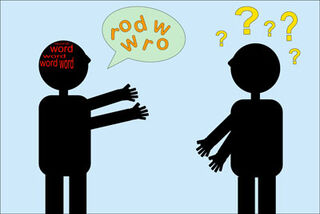Dealing With Aphasia in Seniors

Aphasia is a speech and language disorder that is common in people who have had a stroke, a traumatic brain injury, or other neurological diseases like Alzheimer’s disease and dementia. A person’s capacity to comprehend language, communicate, and understand both the spoken and written word is impaired by the disorder.
Signs and Symptoms of Aphasia
Signs and symptoms of aphasia include:
- Trouble naming familiar objects, people, places and events
- Difficulty expressing oneself when speaking or writing
- Trouble reading or spelling
- Trouble understanding conversations
- Leaving out small words from sentences
- Speaking in short phrases that take much effort to get out
- Mixing up sounds in words
- Making up words
- Trouble with numbers or doing simple math
- Saying the wrong word in-a-given situation, or substituting a word that doesn’t make sense
If loved one is experiencing one or more of these signs, it is important to find effective ways to communicate with them to ensure their continued freedom and independence.
Speech Therapy for Aphasia
Speech therapy works to help patients concentrate in order to find the right words to speak, as well as respond to verbal and vocal cues. The goal of the therapy is to have the patient reach the maximum possible functionality of their speech, though this is very dependent on whether or not their pre-existing conditions will hamper it. It is important to note that the therapy is usually recommended for patients who’ve suffered a stroke, or a brain injury and it must be taken as soon as possible to have a better chance of a full recovery.
Some of the benefits of speech therapy include:
- Improvement of cadence and tone of speech
- Strengthens vocal cord muscles and decreasing the likelihood of choking.
- Increasing comprehension and verbal expression
- Increased cognition that will benefit patient’s communication, attention, and problem-solving skills.
Unfortunately, not every person is a candidate for speech therapy. Aphasia that is caused by progressive brain disorders like the aforementioned dementia and Alzheimer’s may be able to participate in therapy sessions to help them improve or maintain their language abilities over the short term, but sadly will not reverse their conditions.
Communicating with Elders Who Have Aphasia
While speech therapy is being pursued, a speech-language pathologist can also help families and friends understand what the person struggles with and also provide specific recommendations for communicating more effectively.
- When trying to communicate, make sure to reduce environmental distractions, such as the television, music, or other electronic devices.
- When the person is trying to explain something, do not rush them. Give them time to process what they are trying to say.
- When there is difficulty coming up with a word, encourage the person to describe the item, gesture or even draw it.
- Use yes and no questions instead of asking for very specific details.
- If there are problems with comprehension of the spoken word, it may be helpful to speak in shorter, less complex sentences.
- When instructing someone, it is important to slow the rate of your speech and provide directions only one or two steps at a time.
Communicating With Elders with Severe Aphasia
Some forms of aphasia may permanently impair an elder’s ability to verbally communicate, but hope is not lost. There are still ways to adjust and still be able to communicate well with seniors.
a) Electronic Devices
There are electronic tools, or applications that can be utilized to allow users to type in personalized messages that the device can verbally deliver at the touch of a button. Though of course seniors must learn using such devices if they are unfamiliar with it, but it can be an immensely vital tool in the long run to maintain communication
b) Image Sets
An image, or symbol, set allows a senior to simply point at pictures that describe what they are trying to express. For example, a senior refers to the image of a bed to indicate they wish to rest, or at a picture of a food to express that they are hungry.
c) Using a White Board
A white board and erasable markers are another effective way for a seniors to express what they’re thinking, as they can simply write words or sentences on the board and then wipe them off when finished before doing it again.
d) Sign Language
American Sign Language (ASL) is a reliable way for you both to connect with one another. ASL instructional books or online videos can teach both senior and both how to sign the letters of the alphabet and use word symbols to communicate effectively with one another.
e) Touch Therapy
The human touch is integral to keeping non-communicative responses between you and your loved one. However, it’s best to tell your loved one what you’re doing in advance before doing non-verbal cues like hugging or adjusting their clothes for example, and quite simply you will just need to gauge their facial expressions to know whether or not they are happy, sad or peeved at the gesture you wish to do.
Conclusion
Regardless of a loved one’s health difficulties, one of the most important things to consider is how to help them preserve their quality of life. Communication is an important part of human life. Even if a senior is unable to converse properly because of aphasia, their family and friends should treat them with respect and communicate with them through touch. These gestures will help them to stay connected.
Links
- https://southcoastpostacute.com/what-speech-therapy-can-do-for-elderly/
- https://www.knollwoodnursingcenter.com/benefits-of-speech-therapy-for-elderly/
- https://www.mayoclinic.org/diseases-conditions/aphasia/symptoms-causes/syc-20369518
- https://my.clevelandclinic.org/health/diseases/5502-aphasia

Leave a Reply
Want to join the discussion?Feel free to contribute!